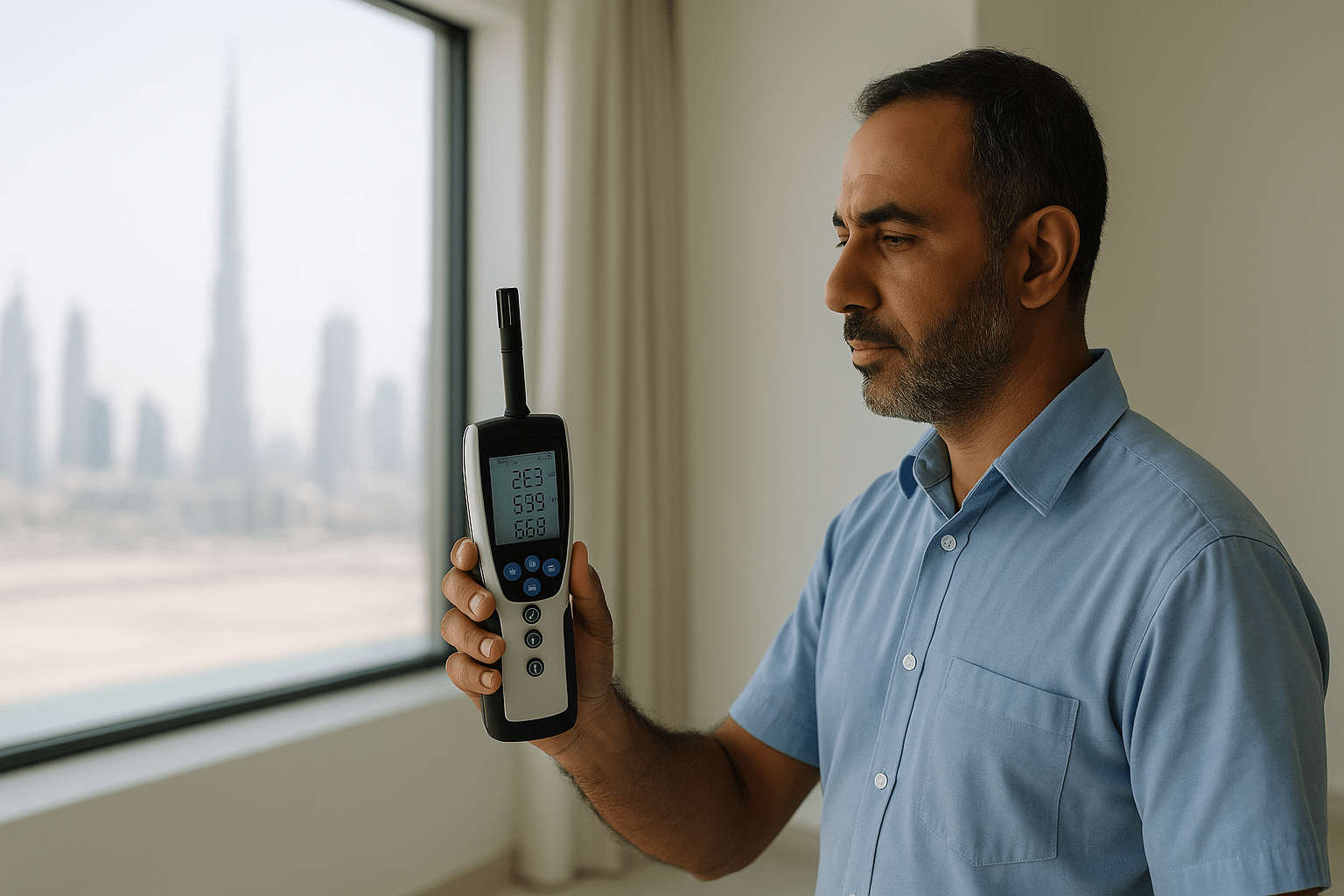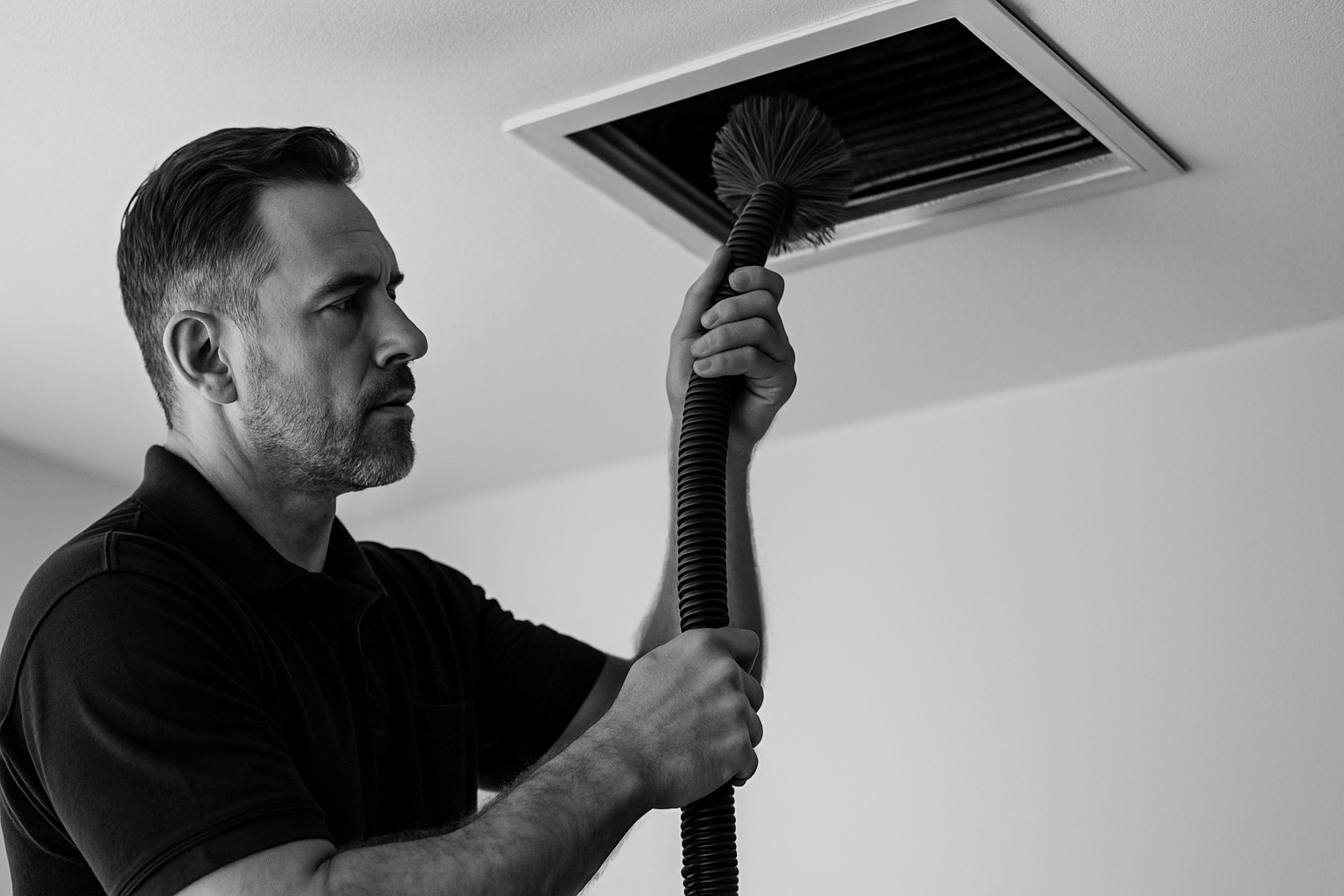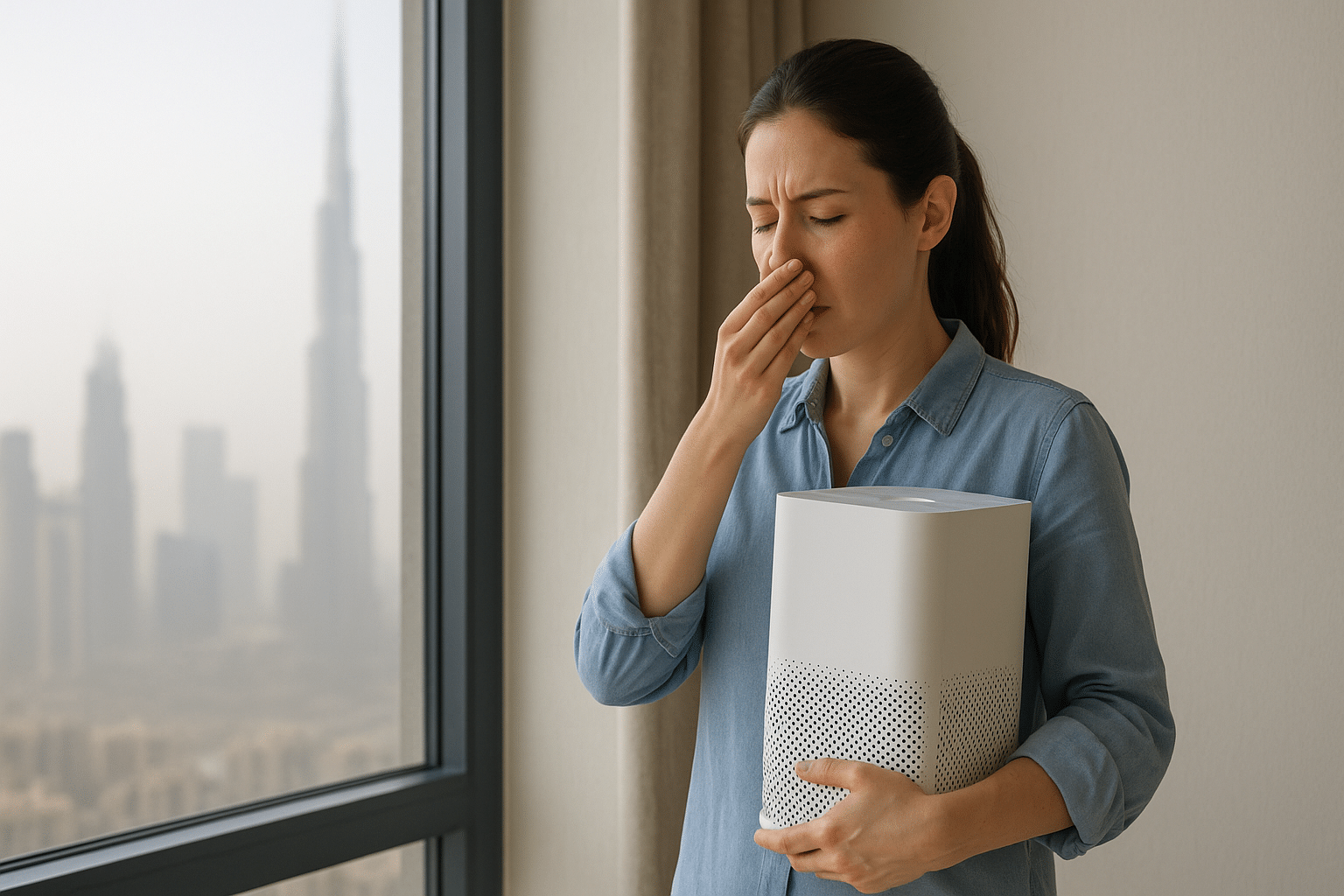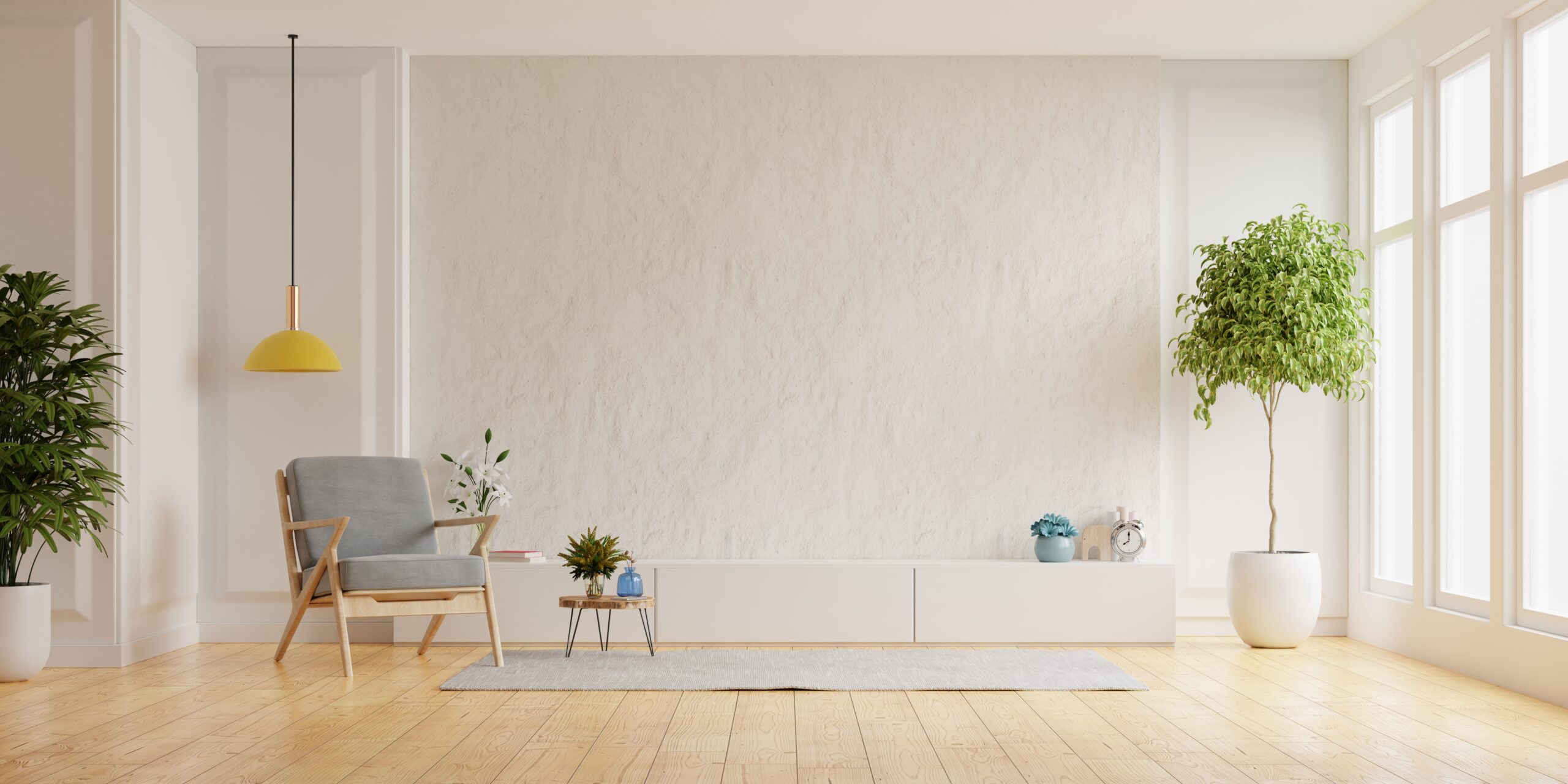
9 Key Benefits of Indoor Air Quality Testing Dubai You Must Know
Table of Contents
Contents
- 1 Table of Contents
- 2 Why Indoor Air Quality Testing Is Critical
- 3 How Indoor Air Quality Testing Works in Dubai
- 4 Benefits of Regular AC Maintenance and Cleaning
- 5 Common Pollutants Found in Dubai Indoor Environments
- 6 How to Choose Indoor Air Quality Testing Services in Dubai
- 7 Key Frequently Asked Questions About Indoor Air Quality Testing Dubai
- 7.1 What areas in Dubai benefit most from indoor air quality testing?
- 7.2 How often should indoor air quality testing be done in Dubai properties?
- 7.3 Does indoor air quality testing include HVAC system inspection?
- 7.4 Can I improve indoor air quality without testing?
- 7.5 How long does an indoor air quality test take?
- 8 Industry Standards and Regulations for Indoor Air Quality in Dubai
- 9 Practical Tips to Maintain Healthy Indoor Air in Your Dubai Property
- 10 Conclusion and Call to Action
- 11 Comprehensive Insights into Indoor Air Quality Testing Dubai
- 11.1 Why Indoor Air Quality Matters in Dubai
- 11.2 Key Pollutants Monitored in Indoor Air Quality Testing
- 11.3 Indoor Air Quality Testing Methods Utilized in Dubai
- 11.4 Benefits of Conducting Indoor Air Quality Testing Dubai
- 11.5 Best Practices for Maintaining Healthy Indoor Air Quality in Dubai
- 11.6 Choosing the Right Indoor Air Quality Testing Service in Dubai
Why Indoor Air Quality Testing Is Critical
Indoor air quality testing Dubai is an essential service for maintaining healthy environments in residential and commercial properties throughout Dubai. Given the region’s unique climate and urban density, indoor air can harbor contaminants affecting comfort, wellness, and productivity. Testing identifies pollutants such as dust, mold spores, VOCs (volatile organic compounds), and microbial agents that often go undetected until they cause health symptoms. Recognizing the air quality status early helps property owners take corrective action promptly.
Dubai’s hot weather means air conditioning systems run extensively, which if not maintained properly, may exacerbate indoor pollution. Monitoring and testing indoor air quality become critical components of proactive building management strategies.
How Indoor Air Quality Testing Works in Dubai
The process of indoor air quality testing Dubai generally involves a professional inspection where specialized instruments measure key air parameters. These include airborne particulates, humidity levels, carbon dioxide, carbon monoxide, and chemical contaminants. Collecting air samples allows laboratory analysis of fungal spores, bacteria, and VOC concentrations relevant to Dubai residential and commercial settings.
Technicians often examine HVAC systems, ducts, and filters as common sources of indoor pollutants. The data gathered provides a detailed overview specific to the Dubai microclimate and urban environment. Many testing companies focus exclusively on Dubai, offering tailored insights into local regulatory requirements and environmental factors.
Benefits of Regular AC Maintenance and Cleaning
The significance of regular AC maintenance and cleaning ties directly to indoor air quality testing Dubai. Maintenance ensures the removal of accumulated dust, microbial growth, and other contaminants that can reside within air conditioning units and ductwork. This upkeep improves airflow efficiency, reducing energy consumption while maintaining air purity.
Key benefits include:
- Improved Health Outcomes: Removing allergens and pathogens decreases respiratory issues and allergy flare-ups prevalent in Dubai’s indoor environments.
- Enhanced System Efficiency: Clean AC systems operate more effectively, extending equipment lifespan and reducing breakdowns in Dubai’s demanding climate.
- Better Odor Control: Eliminates musty or stale odors caused by microbial buildup.
- Compliance with Dubai Regulations: Helps meet Dubai Municipality and DHA guidelines concerning air quality and hygiene.
- Higher Indoor Comfort Levels: Maintains consistent temperatures and humidity for occupant comfort.
Coupling regular testing with routine AC cleaning maintains a safe living and working environment, making this combination a practical approach for Dubai properties.
Common Pollutants Found in Dubai Indoor Environments
Indoor air quality testing Dubai often reveals prevalent contaminants shaped by the local environment and lifestyle. Common pollutants include:
- Dust and Particulates: Desert dust and fine sand infiltrate indoor spaces, combining with indoor sources.
- Mold and Mildew Spores: High humidity in some Dubai locales encourages fungal growth, especially in poorly ventilated areas.
- Volatile Organic Compounds (VOCs): Emitted from paints, cleaning agents, and furnishings common in Dubai homes and offices.
- Carbon Dioxide (CO2) and Carbon Monoxide (CO): Build-up from cooking, vehicle emissions, and HVAC equipment impacts air freshness.
- Biological Contaminants: Including pollen, pet dander, and bacteria affecting sensitive individuals.
A thorough testing service identifies these hazards, helping Dubai residents implement effective remediation strategies.
How to Choose Indoor Air Quality Testing Services in Dubai
Selecting the right indoor air quality testing Dubai provider requires careful consideration of experience, credentials, and technology. Here are practical tips for Dubai property owners:
- Local Expertise: Choose companies that specialize in Dubai’s climate, regulations, and common air quality issues. For comprehensive indoor air quality testing Dubai, consider reputable providers like Saniservice.
- Certified Testing Procedures: Ensure the testing follows Dubai Municipality or Dubai Health Authority standards.
- Comprehensive Reporting: Look for clear, actionable reports with recommendations suited to Dubai properties.
- Use of Advanced Equipment: Modern IAQ monitors and sampling methods detect a full spectrum of pollutants.
- Post-Test Support: Professional advice on remediation, including AC system cleaning and maintenance.
Connecting with NADCA (National Air Duct Cleaners Association) certified specialists is crucial for ensuring adherence to top industry standards in indoor air quality testing Dubai.
Key Frequently Asked Questions About Indoor Air Quality Testing Dubai
What areas in Dubai benefit most from indoor air quality testing?
Homes, offices, healthcare facilities, schools, and hospitality venues in Dubai all benefit greatly. Locations with high occupancy and extensive air conditioning usage particularly need regular testing.
How often should indoor air quality testing be done in Dubai properties?
Biannual testing is advisable for residential properties; commercial and healthcare settings may require more frequent assessments per Dubai Health guidelines.
Does indoor air quality testing include HVAC system inspection?
Most comprehensive services incorporate HVAC inspections because these systems significantly influence indoor air cleanliness in Dubai buildings.
Can I improve indoor air quality without testing?
While basic measures help, testing pinpoints specific issues enabling targeted solutions tailored to Dubai’s environmental factors.
How long does an indoor air quality test take?
Testing duration varies but typically ranges from 2 to 5 hours, depending on property size and scope of analysis within Dubai locations.
Industry Standards and Regulations for Indoor Air Quality in Dubai
Dubai follows robust air quality guidelines aligned with the Dubai Municipality and Dubai Health Authority. These set thresholds for pollutants, ventilation rates, and HVAC maintenance protocols to safeguard occupant health in line with local climatic conditions.
Indoor air quality testing Dubai providers must comply with these regulations to ensure accurate, actionable results. Building codes emphasize proper design, filtration, and cleaning of ventilation systems to prevent pollutant accumulation typical in Dubai’s hot and dusty environment.
Engaging accredited professionals knowledgeable of these standards helps Dubai property owners achieve compliance and protect health effectively.
Practical Tips to Maintain Healthy Indoor Air in Your Dubai Property
- Schedule Regular Indoor Air Quality Testing: Stay ahead of potential problems unique to Dubai’s environment.
- Implement Routine AC Cleaning and Maintenance: Prevent dust and microbial build-up in your air conditioning systems.
- Use Air Purifiers with HEPA Filters: Efficiently reduce particulates and allergens indoors.
- Control Humidity Levels: Avoid mold growth by maintaining optimal humidity using dehumidifiers if needed.
- Ventilate When Possible: Open windows during cooler months in Dubai neighborhoods such as Dubai Marina or Arabian Ranches to refresh indoor air.
- Avoid VOC-Emitting Products: Choose low-VOC paints and eco-friendly cleaning agents available locally.
Conclusion and Call to Action
Indoor air quality testing Dubai is a practical, effective strategy to ensure healthy, comfortable living and working spaces in a demanding urban environment. Regular AC maintenance combined with precise air testing safeguards occupant wellbeing and system efficiency, uniquely benefiting Dubai property owners.
To maintain indoor air quality and comply with Dubai’s health standards, schedule your indoor air quality testing Dubai service today. Trust reputable experts such as Saniservice for local expertise and proven results tailored to Dubai’s distinct needs.
Comprehensive Insights into Indoor Air Quality Testing Dubai
Indoor air quality (IAQ) is a vital aspect of healthy living and working environments, especially in a bustling metropolis like Dubai. With rapid urbanization, modern high-rises, and varying climatic conditions, the importance of understanding and managing indoor air quality cannot be overstated. Indoor air quality testing Dubai serves as an essential tool for residents, businesses, and property managers to ensure that indoor environments are safe, comfortable, and compliant with local standards. This section delves deeper into key considerations, methodologies, and benefits related to indoor air quality testing specific to Dubai’s unique context.
Why Indoor Air Quality Matters in Dubai
Dubai’s climate is characterized by hot, arid conditions for most of the year, which encourages widespread use of air conditioning and mechanical ventilation systems to maintain indoor comfort. While these systems improve comfort, they can inadvertently contribute to poor indoor air quality if not properly maintained. Dust storms, high humidity in certain areas, and the presence of volatile organic compounds (VOCs) from building materials and furnishings further complicate indoor air environments.
Poor IAQ can lead to a range of health problems including respiratory issues, allergies, headaches, and fatigue. Moreover, the current emphasis by the Dubai Municipality and Dubai Health Authority (DHA) on maintaining nutritional and environmental wellbeing highlights air quality as a priority for public health. Compliance with local regulations, like those referenced in the Dubai Municipality’s environmental guidelines, not only ensures health safety but also enhances workplace productivity and occupant satisfaction. For optimal compliance and peace of mind, consider regular indoor air quality testing Dubai services.
Key Pollutants Monitored in Indoor Air Quality Testing
Indoor air quality testing Dubai typically focuses on detecting and quantifying a range of common pollutants that affect air safety indoors. These include:
– **Particulate Matter (PM2.5 and PM10):** Fine particles originating from dust, smoke, and construction activities common in Dubai’s fast-growing urban zones.
– **Volatile Organic Compounds (VOCs):** Emitted by paints, adhesives, plastics, and cleaning agents used widely in Dubai’s commercial and residential interiors.
– **Carbon Dioxide (CO2):** Elevated CO2 levels indicate poor ventilation, which is crucial to monitor in densely occupied spaces such as offices in Business Bay or residential communities in Arabian Ranches.
– **Carbon Monoxide (CO):** Often linked to combustion appliances and vehicle emissions infiltrating indoor spaces, especially in areas close to busy roads like Sheikh Zayed Road.
– **Biological Pollutants:** Molds, bacteria, and allergens, which can thrive in improperly ventilated or humid environments within Dubai’s residential and commercial buildings.
The testing process includes measuring the concentration of these contaminants to benchmark them against thresholds established by local standards like the Dubai Municipality’s environmental regulations and DHA recommendations.
Indoor Air Quality Testing Methods Utilized in Dubai
Professional indoor air quality testing providers in Dubai use a combination of advanced equipment and scientifically sound methodologies tailored to meet local environmental and regulatory requirements. These include:
– **Real-Time Monitoring Devices:** Portable devices that provide instant readings for pollutants such as particulate matter, CO2, and VOCs, allowing fast assessments in offices or residential complexes throughout Dubai Marina, Downtown Dubai, or Jumeirah.
– **Air Sampling and Laboratory Analysis:** For more detailed and accurate measurement of chemical compounds and biological contaminants, air samples are collected and analyzed at accredited laboratories within Dubai.
– **Thermal and Humidity Measurement:** These parameters are essential to assess because Dubai’s climate can cause fluctuating indoor humidity, which affects air quality and microorganism growth.
– **HVAC System Inspections:** Testing often includes evaluation of heating, ventilation, and air conditioning systems, particularly in large buildings such as those in Dubai Media City or Dubai International Financial Centre, to ensure they are not contributing to pollutant buildup or failing to provide adequate air exchange.
Benefits of Conducting Indoor Air Quality Testing Dubai
Engaging in thorough indoor air quality testing in Dubai provides extensive benefits beyond obvious health improvements:
– **Enhances Occupant Wellbeing and Productivity:** Proper IAQ management reduces sick days and improves concentration and overall comfort for occupants in residential or commercial environments.
– **Ensures Compliance with Dubai Regulations:** Testing aligns with Dubai Municipality’s mandates, DHA guidelines, and other regulatory frameworks, helping to avoid penalties and facilitate certification processes.
– **Improves HVAC Efficiency:** Identifying pollutants and ventilation issues promotes better maintenance and upgrades to HVAC systems, resulting in energy savings and long-term cost reductions.
– **Informs Targeted Remediation Measures:** Accurate data from IAQ testing assists property managers to implement tailored interventions such as air purifiers, enhanced ventilation, source removal, or humidity control solutions.
– **Supports Green Building Certifications:** For properties seeking LEED or other sustainability certifications recognized in Dubai, proper IAQ testing is often a prerequisite or a valued component.
Best Practices for Maintaining Healthy Indoor Air Quality in Dubai
Beyond comprehensive indoor air quality testing Dubai, maintaining good indoor air quality is critical, particularly during Dubai’s summer months when buildings rely heavily on air conditioning. Recommended best practices include:
– **Regular HVAC Maintenance:** Cleaning filters and ducts reduces buildup of dust and biological contaminants.
– **Use of Low-VOC Materials:** Opting for environmentally friendly paints, adhesives, and furnishings lowers indoor chemical emissions.
– **Controlling Humidity Levels:** Using dehumidifiers in humid months or monitoring moisture to prevent mold growth.
– **Enhancing Natural Ventilation:** Where feasible, combining mechanical ventilation with natural airflow can improve air exchange rates.
– **Implementing Indoor Plants with Air-Purifying Qualities:** Species like snake plants or spider plants, commonly used in Dubai offices and homes, have proven benefits to air quality.
Choosing the Right Indoor Air Quality Testing Service in Dubai
Selecting a local, experienced provider like Saniservice (specialized in Dubai) ensures compliance with Dubai-specific regulations and familiarity with the emirate’s environmental challenges. Key criteria when choosing a service include:
– **Accreditation and Certification:** Look for testers approved by Dubai Municipality and recognized by DHA.
– **Comprehensive Testing Capabilities:** They should test a broad range of pollutants relevant to Dubai’s climate and urban environment.
– **Customized Reporting:** Providers should offer detailed, actionable insights that align with Dubai’s regulatory framework.
– **Expert Recommendations:** Post-testing consultation and remediation guidance tailored to Dubai’s building types and usage patterns.
Indoor air quality testing Dubai is an indispensable service that protects health, supports regulatory adherence, and enhances the overall quality of life for those living or working in this vibrant city. Proper awareness and proactive testing offer long-term benefits, ensuring spaces in Dubai—from Dubai Marina penthouses to offices in Dubai Silicon Oasis—remain safe and inviting.






Leave a Reply